Faith In Action News Archive
Catch a ride on the Pride Bus and March with us on Sunday, June 8th
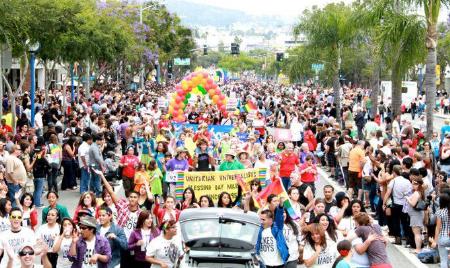 This is going to be the 10th anniversary of our church’s participation in the Gay Pride Parade. About seven years ago, I was marching along with our Santa Monica UU group and I heard a voice yell out from the crowd:, “Hey, Janet!” I looked and I didn’t recognize the person running toward me in the beautiful dress, sunglasses and heels. “Janet, it’s me, Brent!” A few years before, Brent had been one of my very best students at UCLA. We hugged each other like long lost friends. And then, before I left to rejoin my rapidly disappearing fellow UUs, he did something I did not expect — he thanked me for marching. Actually, people all the way up and down the parade route thanked us. They saw that we were young and not so young, gay and straight, singles and families with kids. They read our banners: “Standing on the Side of Love” and “Unitarian Universalists Blessing Gay Marriages since 1959.” Why do I march? I march because I want the world to know that our church welcomes the LGBTQ community. I want everyone to be able to march with pride. I march with pride. You can too.
This is going to be the 10th anniversary of our church’s participation in the Gay Pride Parade. About seven years ago, I was marching along with our Santa Monica UU group and I heard a voice yell out from the crowd:, “Hey, Janet!” I looked and I didn’t recognize the person running toward me in the beautiful dress, sunglasses and heels. “Janet, it’s me, Brent!” A few years before, Brent had been one of my very best students at UCLA. We hugged each other like long lost friends. And then, before I left to rejoin my rapidly disappearing fellow UUs, he did something I did not expect — he thanked me for marching. Actually, people all the way up and down the parade route thanked us. They saw that we were young and not so young, gay and straight, singles and families with kids. They read our banners: “Standing on the Side of Love” and “Unitarian Universalists Blessing Gay Marriages since 1959.” Why do I march? I march because I want the world to know that our church welcomes the LGBTQ community. I want everyone to be able to march with pride. I march with pride. You can too.FAQ: LA Pride Parade on Sunday, June 8
UUJMCA Justice Training
Join us at the Spring Justice Training!
Saturday, May 31
9:30 - 3:00
UU Church of Studio City
12355 Moorpark Street, Studio City
For more information or to register, visit uujmca.org/justicetraining
Sponsored by: The Unitarian Universalist Justice Ministry of California,
Los Angeles & San Fernando Valley Cluster
$20 per person, no one turned away
UUJM sustaining members receive $5 discount
FIA Program on Syria
 More than 30 people heard UCLA doctoral candidate Ziad Abu-Rish speak on “Making Sense of the Syrian Tragedy” on April 20. The conflict began in 2011 when a group of boys in Daraa, inspired by the Tunisian uprising, publicly asserted that the people wanted the Syrian regime of Bashar al-Assad to fall. Their arrest and execution ignited the uprising, initially a civilian non-violent mass movement, which evolved into a militarized conflict between various factions and the regime and among the factions. Now, more than 130,000 people have been killed, 50% require direct aid to meet basic needs, and more than 9,000,000 have been displaced internally or externally.
More than 30 people heard UCLA doctoral candidate Ziad Abu-Rish speak on “Making Sense of the Syrian Tragedy” on April 20. The conflict began in 2011 when a group of boys in Daraa, inspired by the Tunisian uprising, publicly asserted that the people wanted the Syrian regime of Bashar al-Assad to fall. Their arrest and execution ignited the uprising, initially a civilian non-violent mass movement, which evolved into a militarized conflict between various factions and the regime and among the factions. Now, more than 130,000 people have been killed, 50% require direct aid to meet basic needs, and more than 9,000,000 have been displaced internally or externally.
Abu-Rish stressed Syria’s strategic importance to external powers: U.S., Israel, Saudi Arabia, and Russia as well as the U.S. government’s insistence that Russia and Iran not be included in any negotiations to end the conflict. Please go to www.sdaid.org if you would like to donate to aid Syrian refugees.
-- Roberta Frye
Green Living Committee News
 In celebration of Earth Day, we would like to highlight and focus our attention on recognizing some green and sustainable leaders in our UU Community. The built environment contributes to 40% of our greenhouse gas emissions. Our members are leading the way towards making the built environment a better place to live and having less of an impact on our treasured Blue Marble, Earth.
In celebration of Earth Day, we would like to highlight and focus our attention on recognizing some green and sustainable leaders in our UU Community. The built environment contributes to 40% of our greenhouse gas emissions. Our members are leading the way towards making the built environment a better place to live and having less of an impact on our treasured Blue Marble, Earth.Hunger Fund Donations
 The UUCCSM Hunger Fund is running low! Monetary donations are needed to feed the participants at Step Up on 2nd — the monthly meal served by Faith in Action volunteers, and our sack lunch effort for P.A.T.H. through Lunches for Bunches. Make checks payable to UUCCSM — please mark “hunger” on your check memo line or envelope. For more information send an email to hunger@UUSM.org
The UUCCSM Hunger Fund is running low! Monetary donations are needed to feed the participants at Step Up on 2nd — the monthly meal served by Faith in Action volunteers, and our sack lunch effort for P.A.T.H. through Lunches for Bunches. Make checks payable to UUCCSM — please mark “hunger” on your check memo line or envelope. For more information send an email to hunger@UUSM.orgSave the Date
Save the Date! LA Pride Parade is Sunday, June 8!
(Can anyone help us organize a UU Pride bus?)
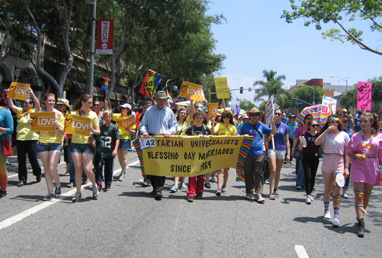 “I’m goin’ marchin’ in the morning
“I’m goin’ marchin’ in the morningProfessor Speaks on Mass Deportation, Racism, and Global Capitalism
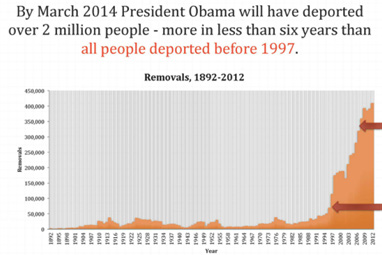 In this slide from Prof. Golash-Boza’s presentation, one arrow points to the spike in annual deportations following the law increasing spending on immigration enforcement signed by President Clinton in 1996. The other arrow points to the spike following the creation of the Homeland Security Department in 2003, which brought even more funds into immigration enforcement.
In this slide from Prof. Golash-Boza’s presentation, one arrow points to the spike in annual deportations following the law increasing spending on immigration enforcement signed by President Clinton in 1996. The other arrow points to the spike following the creation of the Homeland Security Department in 2003, which brought even more funds into immigration enforcement.
We Shall Overcome, Today!
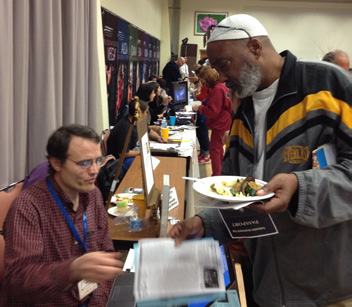 On Monday, January 20, members of the Peace & Social Justice Committee attended the 29th Anniversary Martin Luther King, Jr. Celebration presented by the Rev. Dr. Martin Luther King, Jr. Westside Coalition. Afterwards we shared news and information about the activities of the Peace & Social Justice Committee from a table at the Community Involvement Fair at the SGI Culture of Peace Resource Center. The morning’s program included presentation of awards and scholarships to local students.
On Monday, January 20, members of the Peace & Social Justice Committee attended the 29th Anniversary Martin Luther King, Jr. Celebration presented by the Rev. Dr. Martin Luther King, Jr. Westside Coalition. Afterwards we shared news and information about the activities of the Peace & Social Justice Committee from a table at the Community Involvement Fair at the SGI Culture of Peace Resource Center. The morning’s program included presentation of awards and scholarships to local students.St. Valentine sends cards to Immigration Detainees!
WANTED:
Green Living Hosts Second-Sunday Supper and Program on February 9
Progress for Santa Monica Hotel Workers Celebrated
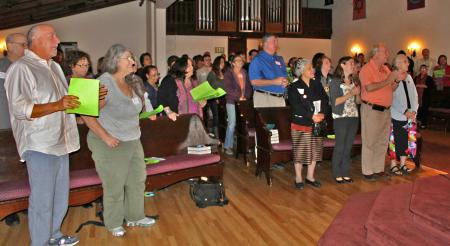 Local hotel workers were joined by the faith community and Santa Monica activists to celebrate recent victories in Santa Monica, which create a precedent for new hotels to agree to pay a living wage or have a union as part of what they offer to the community, at an evening event on Wednesday, January 15.
Local hotel workers were joined by the faith community and Santa Monica activists to celebrate recent victories in Santa Monica, which create a precedent for new hotels to agree to pay a living wage or have a union as part of what they offer to the community, at an evening event on Wednesday, January 15. The evening was highlighted by the words of hotel employee Elsa Mercado, who talked about the physical demands of hotel housekeeping, the challenges of working for low wages, and Progress for Santa Monica Hotel Workers Celebrated the inspiration workers receive from the support of community members. She was joined by Unite-Here Lead Organizer Soldedad Garcia, a former hotel worker at Santa Monica’s Viceroy Hotel. The Lefteous Sisters provided music and led the group in singing “We Shall Not Be Moved” in English and Spanish.
The evening was highlighted by the words of hotel employee Elsa Mercado, who talked about the physical demands of hotel housekeeping, the challenges of working for low wages, and Progress for Santa Monica Hotel Workers Celebrated the inspiration workers receive from the support of community members. She was joined by Unite-Here Lead Organizer Soldedad Garcia, a former hotel worker at Santa Monica’s Viceroy Hotel. The Lefteous Sisters provided music and led the group in singing “We Shall Not Be Moved” in English and Spanish.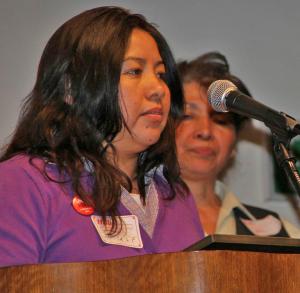 The event recognized the many large and small victories of Santa Monica activists since 1995, when the movement came together in response to a management attempt to decertify the union at the Miramar Hotel. The
The event recognized the many large and small victories of Santa Monica activists since 1995, when the movement came together in response to a management attempt to decertify the union at the Miramar Hotel. ThePeace and Social Justice Committee to Explore Immigration Policies
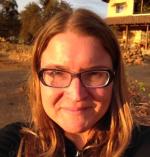 Tanya Golash-Boza, Associate Professor of Sociology at UC Merced, will speak at 1 p.m., Sunday, February 2, in our Sanctuary. Discussion will follow. The Peace and Social Justice Committee invites you and your friends and families to hear Prof. Golash-Boza describe how the immigration policies under George Bush and Barack Obama have caused a massive increase in the numbers of undocumented workers in detention centers and workers’ subsequent deportation. In 2001 the number deported was 186,000; in 2012 it was 409,849. The num er of immigrants held in detention increased from about 190,000 in 2005 to just under 400,000 in 2010. Those masses of workers are about 76% Latino and a great majority (73% in 2008) have families who are residents or U.S. citizens. Their arrest, detention, and deportation leads to disruption of family life, loss of income, and impoverishment and provides an excuse for racist treatment by police, in employment, and in social services.
Tanya Golash-Boza, Associate Professor of Sociology at UC Merced, will speak at 1 p.m., Sunday, February 2, in our Sanctuary. Discussion will follow. The Peace and Social Justice Committee invites you and your friends and families to hear Prof. Golash-Boza describe how the immigration policies under George Bush and Barack Obama have caused a massive increase in the numbers of undocumented workers in detention centers and workers’ subsequent deportation. In 2001 the number deported was 186,000; in 2012 it was 409,849. The num er of immigrants held in detention increased from about 190,000 in 2005 to just under 400,000 in 2010. Those masses of workers are about 76% Latino and a great majority (73% in 2008) have families who are residents or U.S. citizens. Their arrest, detention, and deportation leads to disruption of family life, loss of income, and impoverishment and provides an excuse for racist treatment by police, in employment, and in social services.Cluster Meeting of UU Justice Ministry
Empty Bowls Program Works to Fight Hunger
Interweave Hosts a One-Day-Late Valentine’s Potluck
 MLK Jr Day of Service
MLK Jr Day of Service
Remembering Nelson Mandela
 Edna Bonacich lit the chalice in honor of Nelson Mandela on Sunday, December 8. She lived in South Africa from 1950 to 1960 (ages 10 to 20, so she attended part of elementary school, high school, and college there). Her father had taken his family to Durban to be the first Rabbi of the Reform Jewish Congregation there. The experience of living in South Africa at that critical period shaped Edna’s career towards an interest in race and labor. Photo by Charles Haskell.
Edna Bonacich lit the chalice in honor of Nelson Mandela on Sunday, December 8. She lived in South Africa from 1950 to 1960 (ages 10 to 20, so she attended part of elementary school, high school, and college there). Her father had taken his family to Durban to be the first Rabbi of the Reform Jewish Congregation there. The experience of living in South Africa at that critical period shaped Edna’s career towards an interest in race and labor. Photo by Charles Haskell.
Support Workers’ Rights via Facebook
 In cooperation with CLUE-LA and the Clean Carwash Campaign, we have created a Facebook page to spread awareness about the boycott of Millennium Car Wash and (now included) Santa Monica Car Wash. As you may know, workers at these two businesses have alleged a host of abuses including unfair pay and denial of rest and water breaks. They also claim that fellow workers who have spoken up or attempted to organize for better conditions have been intimidated and/or fired. The family that owns these two car washes is currently the defendant in a class action lawsuit to recover stolen wages. This congregation has been involved for some time in standing up for the worth and dignity of car wash workers, who are among the poorest and most vulnerable members of our community. We have joined with other local faith and community groups in calling for a boycott of these businesses until the owners agree to sit down and negotiate with their employees. Now, with weekly pickets at the car washes currently suspended, social media is an important tool we can all use to spread the word to our friends and neighbors. Please go to www.facebook.com/boycottcarwashes, ”like” the page, share it and encourage others to do the same.
In cooperation with CLUE-LA and the Clean Carwash Campaign, we have created a Facebook page to spread awareness about the boycott of Millennium Car Wash and (now included) Santa Monica Car Wash. As you may know, workers at these two businesses have alleged a host of abuses including unfair pay and denial of rest and water breaks. They also claim that fellow workers who have spoken up or attempted to organize for better conditions have been intimidated and/or fired. The family that owns these two car washes is currently the defendant in a class action lawsuit to recover stolen wages. This congregation has been involved for some time in standing up for the worth and dignity of car wash workers, who are among the poorest and most vulnerable members of our community. We have joined with other local faith and community groups in calling for a boycott of these businesses until the owners agree to sit down and negotiate with their employees. Now, with weekly pickets at the car washes currently suspended, social media is an important tool we can all use to spread the word to our friends and neighbors. Please go to www.facebook.com/boycottcarwashes, ”like” the page, share it and encourage others to do the same.Peace and Social Justice Committee Review of 2013
Conference Addresses Re-Entry Programs for Incarcerated Women
Boycott of Millennium Continues; Owners Feeling the Pressure
 “I feel liberated,” said UUCCSM member Teri Bond as she picketed Millennium Car Wash November 3. “You’re helping me find my voice,” Teri added, noting that she was glad she’d finally been able to make it to the picket line, which has been going on every Sunday from 1 to 3 p.m. since October 13.
“I feel liberated,” said UUCCSM member Teri Bond as she picketed Millennium Car Wash November 3. “You’re helping me find my voice,” Teri added, noting that she was glad she’d finally been able to make it to the picket line, which has been going on every Sunday from 1 to 3 p.m. since October 13. The boycott is sponsored by Clergy and Laity United for Economic Justice (CLUE-LA) and the CLEAN Carwash Campaign, in support of the Carwash Workers Organizing Committee, AFL-CIO.
The boycott is sponsored by Clergy and Laity United for Economic Justice (CLUE-LA) and the CLEAN Carwash Campaign, in support of the Carwash Workers Organizing Committee, AFL-CIO.
 UUCCSM at the Westside Shelter and Hunger Coalition breakfast celebration
UUCCSM at the Westside Shelter and Hunger Coalition breakfast celebration

 Tom Early (shown here with Timothy Sweeney of Venice Community Housing) was recognized by the Westside
Tom Early (shown here with Timothy Sweeney of Venice Community Housing) was recognized by the WestsideOur Annual Coming Out Sunday Was October 6
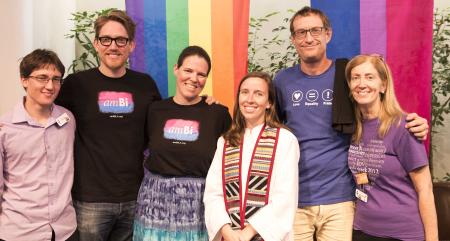
Textbook Fund for Incarcerated Students
Picketers Call for Boycott of Millennium Car Wash; Join Us Every Sunday Afternoon
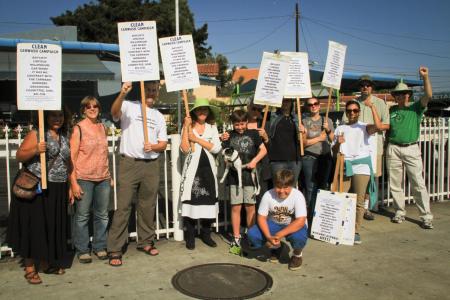
 Green Tip:
Green Tip:
 Textbook Fund
Textbook Fund
 CLUE in the Pulpit
CLUE in the Pulpit
Faith in Action Movie Night
What is FIA?



 Faith in Action is reaching out for possible additional volunteers to help with this service. Two people are needed every Sunday. Ideally, the table should be set up and staffed at 10 a.m., while volunteers after the second service provide coverage and cleanup at 12 noon. This is a great volunteer opportunity, especially for newcomers. For further information contact Cathie Gentile at fia@uusm.org
Faith in Action is reaching out for possible additional volunteers to help with this service. Two people are needed every Sunday. Ideally, the table should be set up and staffed at 10 a.m., while volunteers after the second service provide coverage and cleanup at 12 noon. This is a great volunteer opportunity, especially for newcomers. For further information contact Cathie Gentile at fia@uusm.org
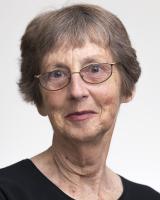 Textbook Fund for Incarcerated Students
Textbook Fund for Incarcerated Students
Visitation Program for Immigrant Detainees Suspended
Picnic Thanks
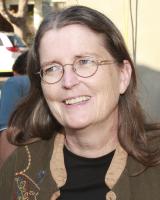 Dear Friends,
Dear Friends,
 CareNet is UUCCSM’s caring network
CareNet is UUCCSM’s caring network


